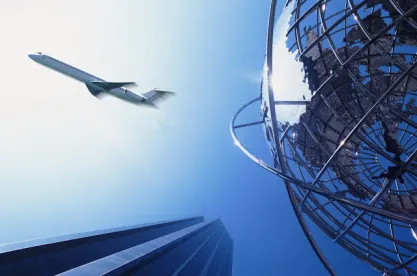On June 28, the US House of Representatives Committee on Transportation and Infrastructure reported out to the floor of the House of Representatives for consideration by the full House H.R. 2997, the 21st Century Aviation Innovation, Reform, and Reauthorization Act (HR 2997). HR 2997, in addition to privatizing US air traffic control, would as amended, prevent entry into the United States of "flag of convenience carriers" and effectively overturn the legal interpretations by the Departments of State, Justice and Transportation of the 2007 Air Transport Agreement Between the United States of America and the European Community and Its Member States as amended in 2010 by the Protocol to Amend the Air Transport Agreement Between the United States of America and the European Community and Its Member States (collectively the ATA).1 Pursuant to the ATA, the US Department of Transportation (DOT) order on December 2, 2016 (Final Order)2 granted a foreign air carrier permit to Norwegian Air International Limited (Norwegian) as a certificated Irish foreign air carrier. The Final Order granted Norwegian economic authority to operate to the United States as a foreign air carrier under 49 USC § 41301, and to conduct foreign scheduled and charter air transportation of persons and property under the ATA.3
The Final Order was the end result of Norwegian's 2013 application for a foreign air carrier permit, which was vigorously opposed by many US and foreign airlines and labor groups. The opponents alleged that Norwegian is using Ireland as a "flag of convenience," contending that it is a subsidiary of the Norwegian flag carrier Norwegian Air Shuttle (NAS), and that Norwegian is based in Ireland to avoid the more restrictive social and labor laws of Norway. Norwegian's business plan involved outsourcing its pilot and cabin crew to a third party based in Singapore to take advantage of lower wages and working conditions.4 Some objectors also asserted that Norwegian's business plan raises safety issues.5
The opponents main argument was that Norwegian's proposed business plan violated Article 17 bis of the ATA. Article 17 bis provides as follows:
"1. The Parties recognise the importance of the social dimension of the Agreement and the benefits that arise when open markets are accompanied by high labour standards. The opportunities created by the Agreement are not intended to undermine labour standards or the labour-related rights and principles contained in the Parties' respective laws.
2. The principles in paragraph 1 shall guide the Parties as they implement the Agreement including regular consideration by the Joint Committee, pursuant to Article 18 of the social effects of the Agreement and the development of appropriate responses to concerns found to be legitimate."6
The DOT rejected this position and concluded, in accordance with the legal interpretations of the ATA from the State Department and Justice Department that Article 17 bis does not contain additional requirements for an applicant to satisfy in order to be granted the right to operate under the ATA. Rather, those requirements are found in Article 4 of the ATA, which provides:
"On receipt of applications from an airline of one Party, in the form and manner prescribed for operating authorizations and technical permissions, the other Party shall grant appropriate authorizations and permissions with minimum procedural delay, provided:
(a) for a U.S. airline, substantial ownership and effective control of that airline are vested in the United States, U.S. nationals, or both, and the airline is licensed as a U.S. airline and has its principal place of business in U.S. territory;
(b) for a Community airline, substantial ownership and effective control of that airline are vested in a Member State or States, nationals of such a state or states, or both, and the airline is licensed as a Community airline and has its principal place of business in the territory of the European Community;
(c) the airline is qualified to meet the conditions prescribed under the laws and regulations normally applied to the operation of international air transportation by the Party considering the application or applications; and
(d) the provisions set forth in Article 8 (Safety) and Article 9 (Security) are being maintained and administered."7
The DOT's Show Cause Order's tentative finding, which was affirmed in the Final Order,8 states:
"The Department has tentatively decided to grant the applicant a foreign air carrier permit, in the form attached as Appendix A to this order. In reaching our decision, the Department tentatively finds that the applicant has demonstrated, based on the record, that it is financially and operationally fit to perform the services authorized; that Irish aviation safety oversight satisfies Federal Aviation Administration (FAA) and ICAO standards; and, that the applicant is substantially owned and effectively controlled by citizens of Member States of the European Union, consistent with the provisions of the U.S.-EU Agreement. We also tentatively find that the authority sought by the applicant is encompassed by the U.S.-EU Agreement."9
In light of the above, and relying on the reciprocal provisions of Article 6 bis of the ATA,10 the DOT concluded that Norwegian met the requirements under 49 U.S.C. § 41302, which provides that the DOT may issue a foreign air carrier permit if:
"…the applicant is fit, willing, and able to provide the foreign air transportation to be authorized by the permit and to comply with this part and regulations of the Secretary; and (2) (A) the applicant is qualified, and has been designated by the government of its country, to provide the foreign air transportation under an agreement with the United States Government; or (B) the foreign air transportation to be provided under the permit will be in the public interest."11
The DOT further stated that, if the applicant is fit under an agreement of the United States, it need not address the question of the public interest under 49 U.S.C. § 41302(2)(B) because "[t]he existence of an air service agreement demonstrates that granting operating authority to a foreign carrier is per se in the public interest." 12
HR 2997 seeks to avoid this result in several ways. First, it seeks to amend the requirements for the issuance of a foreign air carrier permit or an exemption from such permit. In this regard if a party is seeking authorization under the ATA and an issue is raised by an interested party under Article 17 bis, the Secretary of Transportation could not issue such permit or exemption unless it:
"(1) finds that issuing the permit or exemption would be consistent with the intent set forth in Article 17 bis of the Agreement, that opportunities created by the Agreement do not undermine labor standards or the labor-related rights and principles contained in the laws of the respective parties to the Agreement; and (2) imposes on the permit or exemption such conditions as may be necessary to ensure that the person complies with the intent of Article 17 bis."13
HR 2997 further seeks to undermine the Secretary of Transportation's authority in issuing foreign air carrier permits under 49 U.S.C. § 41302 by removing its power to conclude an applicant is qualified because such an applicant is qualified under an agreement with the United States. This modification seeks to prevent reliance upon reciprocal provisions of air transport agreements, such as Article 6 bis of the ATA. It also makes a public interest determination mandatory, in that the Secretary could no longer conclude that a permit is in the public interest only, based upon qualifications under an air transport agreement.14
HR 2997 makes a broad statement that preventing entry into the United States by "flag of convenience carriers" is a policy to be considered generally by the Secretary of Transportation. It proposes to amend 49 U.S.C. § 40101(a) by adding that "preventing entry into United States markets by flag of convenience carriers" is in the public interest.15 It further proposes to amend 49 U.S.C. 40101(e)(9) by stating that one of the policies of the United States, when formulating air transport agreements, is the elimination of unfair competitive practices, which may be caused by the "erosion of labor standards associated with flag of convenience carriers."16 HR 2997 finally defines a flag of convenience carrier as, "a foreign air carrier that is established in a country other than the home country of its majority owner or owners in order to avoid regulations of the home country."17
It remains to be seen if HR 2997 as amended will be passed by the House, or if it will eventually become law as part of FAA reauthorization or as an independent bill.18 Clearly, FAA reauthorization is needed in some form, with or without the prohibitions against alleged flag of convenience carriers or the privatization of US air traffic control. It does however represent an effort to overturn the open skies policies that have been the product of both Democratic and Republican administrations, and which have guided US international aviation policy for many years. It would also be a turn to protectionism and an alleged implicit overturning of the ATA, which may trigger termination notices under ATA Article 23,19 arbitration under Article 19,20 or and one would think at a minimum, consideration by the Joint Committee formed under Article 18 of the ATA.21
1 Air Transport Agreement Between the United States of America and the European Community and Its Member States Apr. 25– 30, 2007, 46 I.L.M. 470 as amended in 2010 by the Protocol to Amend the Air Transport Agreement Between the United States of America and the European Community and Its Member States, Signed on April 25 and 30, 2007, June 24, 2010, 2010 O.J. (L 223) 3.
2 Department of Transportation Order 2016-11-22, issued November 30, 2016, Docket DOT-OST-2013-0204).
3 Id.
4 Department of Transportation Order 2016-4-12, issued April 15, 2016, Docket DOT-OST-2013-0204, p 3.
5 Id.
6 2010 Protocol to Amend the Air Transport Agreement Between the United States of America and the European Community and Its Member States, Signed on April 25 and 30, 2007, June 24, 2010, 2010 O.J. (L 223) 3.
7 Air Transport Agreement Between the United States of America and the European Community and Its Member States, Apr. 25–30, 2007, 46 I.L.M. 470.
8 Department of Transportation Order 2016-11-22, issued November 30, 2016, Docket DOT-OST-2013-0204), p.3.
9 Department of Transportation Order 2016-4-12, issued April 15, 2016, Docket DOT-OST-2013-0204, p 7.
10 Article 6 bis provides in relevant part as follows:
"Upon receipt of an application for operating authorisation, pursuant to Article 4, from an air carrier of one Party, the aeronautical authorities of the other Party shall recognise any fitness and/or citizenship determination made by the aeronautical authorities of the first Party with respect to that air carrier as if such a determination had been made by its own aeronautical authorities and not enquire further into such matters…"
11 49 U.S.C. § 41302 , See also Department of Transportation Order 2016-4-12, issued April 15, 2016, Docket DOT-OST-2013-0204, p 7.
12 Id.
13 Amendment to H.R. 2997, https://transportation.house.gov/uploadedfiles/lobion_020_xml.pdf.
14 Id.
15 Id.
16 Id.
17 Id.
18 See HR 2150, Flags of Convenience Don't Fly Here Act; https://www.congress.gov/bill/115th-congress/house-bill/2150/text.
19 Air Transport Agreement Between the United States of America and the European Community and Its Member States, Apr. 25– 30, 2007, 46 I.L.M. 470.
20 Id.
21 2010 Protocol to Amend the Air Transport Agreement Between the United States of America and the European Community and Its Member States, signed on April 25 and 30, 2007, June 24, 2010, 2010 O.J. (L 223) 3.




 />i
/>i
